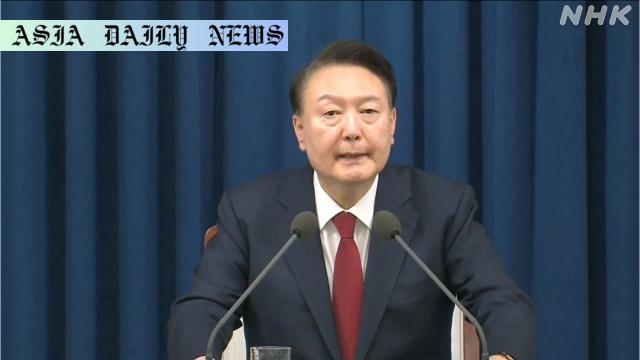Impeachment: Former intel official reveals President Yoon’s controversial orders amid martial law trial questioning.

Shocking Revelation: South Korea’s Impeachment Drama Unfolds
Backdrop: The Trial of President Yoon Suk-yeol
South Korea’s political climate has been embroiled in controversy as the impeachment trial of President Yoon Suk-yeol unfolds at the Constitutional Court. On Tuesday, this saga took a dramatic turn when former first deputy director of the National Intelligence Service (NIS), Hong Jang-won, provided stunning revelations about Yoon’s alleged orders during the martial law declaration last December. These startling accusations have further fueled debate over the president’s accountability and actions amidst heightened political tension.
The Controversial Testimony
During the fifth hearing of the impeachment trial, Hong testified as a key witness, stating that he received direct instructions from President Yoon to “round them all up” amid martial law enforcement. According to Hong, this directive allegedly came through a presidential phone call during the declaration. Hong also revealed that the then-chief of the Defense Counterintelligence Command indicated the targeted number of individuals for arrest ranged between fourteen to sixteen individuals. These accusations sent shockwaves across the courtroom and reignited public scrutiny over the president’s actions.
President Yoon’s Denial
President Yoon Suk-yeol attended the hearing to counter these allegations personally. He denied issuing any orders for widespread arrests and clarified that his phone call to Hong was strictly related to aiding military authorities in investigating espionage activities. Describing Hong’s testimony as erroneous, Yoon reiterated his stance that the allegations against him are politically motivated and not rooted in factual evidence. His defense team has repeatedly argued that the martial law declaration was carried out in adherence to South Korean constitutional processes.
The Detention Controversy
In addition to the core impeachment trial, President Yoon faces detention related to charges of insurrection. In a separate development on Tuesday, Yoon’s legal team officially requested the court to overturn his detention order. The president, who has been detained and indicted, argued that the charges lack legal justification. Yonhap News Agency has reported that the Constitutional Court has seven days to respond to this critical request, a decision that could significantly impact the trial’s trajectory.
The Political Divisiveness
The impeachment trial has deeply polarized South Korea’s political landscape. Supporters of President Yoon argue that the allegations are part of a broader political conspiracy aimed at destabilizing his administration. On the other hand, critics contend that the trial is a necessary step towards ensuring accountability and preventing abuse of power. The unfolding proceedings have captivated both the domestic and international audience, intensifying discussions about the balance of power and justice in democratic governance.
Broader Implications
This high-stakes impeachment case highlights the broader challenges faced by democratic institutions in handling allegations of executive overreach. The court’s verdict will not only determine President Yoon’s political fate but also set a precedent for addressing martial law declarations and their associated complexities in the future. Furthermore, the trial underscores the role of judicial systems in upholding constitutional order amidst political upheaval.
Next Steps in the Trial
As the Constitutional Court continues its deliberations, all eyes remain on the forthcoming rulings and potential discoveries unearthed during subsequent hearings. The seven-day period for addressing Yoon’s detention request adds an additional layer of suspense and intrigue. Regardless of the trial’s outcome, it is evident that the proceedings will have wide-reaching implications on South Korea’s political landscape and its public trust in governance systems.
Commentary
The Complexity of Impeachment Trials
Impeachment trials, especially those involving allegations of executive overreach, provide a window into the strength and resilience of a nation’s democratic institutions. The case surrounding President Yoon Suk-yeol is no exception, as it has unveiled contentious and deeply polarizing issues. While the accusations leveled against Yoon raise serious concerns, they simultaneously call for a fair and impartial judicial process to ascertain the truth. This is a pivotal moment for South Korea as it navigates these turbulent waters, balancing political accountability with adherence to constitutional values.
The Role of Testimonies
Hong Jang-won’s testimony has become a focal point for this trial, shedding light on the alleged directives issued during the martial law enforcement. However, it also raises broader questions about the reliability of testimonies in high-stakes cases. President Yoon’s firm denial adds another layer of complexity to the narrative. As the court evaluates this conflicting evidence, we are reminded of the importance of transparency and rigorous examination in delivering justice under challenging circumstances.
A Watershed Moment for South Korea
Beyond the courtroom, the impeachment trial serves as a reflection of South Korea’s maturing democracy. The discourse surrounding this case has reignited crucial debates about executive power, judicial independence, and the role of public opinion in shaping governance. As the nation watches this drama unfold, the hope remains that the resolution will strengthen democratic principles and restore faith in the country’s governance systems.


